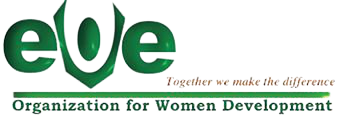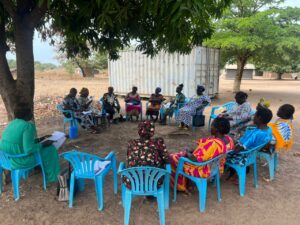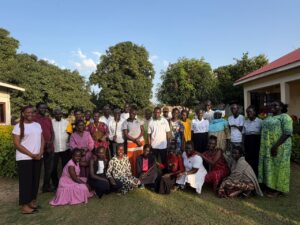The government established a high-Level taskforce (HLTF) on COVID-19 tasked with the responsibility to curb the outbreak, which was later on reconstituted and is currently referred to as the National Taskforce on Coronavirus Disease. The previous task force was formed of mostly politicians and decisions made in regards to COVID-19 were detached from the reality on the ground and did not reflect inclusivity and gender-sensitive perspectives that would ensure the best interest of all citizens.
Decades of conflict brought about a noticeable shift in the way of life of South Sudanese families, especially in the area of gendered division of labor. Due to large number of men going to war and a large number being killed, there was an increase in the number of women-led households. More women took and continue to take the opportunity out of necessity to actively engage in petty trade and construction in order to provide for their families.
The lockdown decree taken by the first task force, did not take into consideration the impact on the income of the vast majority that engage in street vending and tea selling – who are the women. The closure of such small businesses became detrimental to families as no alternatives are provided. Food item prices spiked and local transportation cost doubled. As a result, the social and economic welfare of women and other vulnerable groups such as the elderly and persons with disabilities continued to deteriorate as the lockdown prolonged. Some women headed households reported to not having food to feed their families which put many families in jeopardy of running the risk of being evaded through other means such as bribes and violence.
Another issue that needs attention during this crisis is lack of adequate information among citizens, especially women and girls, which leads to the pandemic and its possible effects not being taken seriously. In efforts to combat the outbreak, Eve Organization engaged in awareness raising and sensitization of the public on corona virus and preventive messages to be taken, through media and caravan campaigns. The media campaign consisted of radio jingles, recorded in English and simplified Juba Arabic, posters, stickers, graphic designs posted on social media pages and use of hashtags. The campaign majorly targeted women and men in markets such as food vendors, who mostly remain vulnerable to contracting the virus, and as a result loss of their source of livelihood. The caravan campaign targeted market areas around Juba, where women and the general public were sensitized through distribution of IEC materials and masks as well as liquid soap to residential areas.
The COVID-19 awareness project also supported the work of local entrepreneurs. The masks used in the campaign were sourced from Jotaba Fashion House, a local woman owned business in Juba. Penny Nandole expressed that she was thankful and proud to work with fellow women leading the fight against the Corona Virus Pandemic. It was an accomplishment for the campaign to see masks being worn by people around Juba as well as IEC materials posted around shops in market places.
Despite positive results from the campaign, it was realized that there is still dire need to upscale awareness raising and sensitization as majority of people lack information and are not practicing preventive measures. During the campaign there was no observation of social distancing, masks were not being worn and few to none hand washing points were available.
The government took the decision in May 2020 to lift restrictions that were intended to control the spread of the virus. As the number of cases continue to rise at an alarming rate, with cases already at 1000 during the writing of this article, health workers at the front line show concern that the decision to lift the restrictions were made prematurely. Is the country’s fragile health system able to cope with the increase in patients? Are the needs of women health workers, such as menstrual hygiene, taken into consideration? There continues to be lack of attention paid to this issue, despite women making up the majority of health workers.
Three rape cases have been reported in Juba, in the span of one month during this pandemic period. Past experience from the 2013-2015 Ebola virus disease (EVD) outbreak in West Africa, records that response efforts never established protocols to protect adolescent girls and young women during the outbreak. As quarantines and school closures were put in place to contain the spread of disease, women and adolescent girls were vulnerable to coercion, exploitation, and sexual abuse, some of which resulted in unwanted pregnancies. It is therefore important that interventions to address COVID-19 ensure equitable health services and consider gender based violence as essential and provide women and girls with security, livelihood skills, psychosocial counseling for GBV and referral services. IDP camps also remain vulnerable to the disease as they have limited access to health services, congested living spaces and limited access to clean water. Where are the policies to protect these groups? Is it not better to draw lessons learned and best practices from past experiences than to count damages in hindsight?
The current taskforce is not fully functional at the moment as a transitional committee has been put in place to carry out a transfer of responsibilities. During this period of transition and even after, what is the fate of the South Sudanese people? Furthermore, there still continues to be a lack of representation of women and other groups in the members of the task force. The above mentioned areas of concern, all require specific responses in order to effectively minimize and combat effects of the virus. This can only be done if the taskforce makes inclusive and tailored decisions through a multi-sectorial response to the pandemic which should include targeted funding and consultation of different groups such as Women, youth and persons with disabilities at decision making levels.
The COVID-19 response must be a humanitarian one where governments, national and international NGO’s and other relevant actors work together.
EVE’s acknowledges the support of OSEIA, the Distinguished Partners for Women, Peace and Security, Global Fund for Women and Global Network of Women Peacebuilders for their support. Only together, can we fight to defeat COVID-19.


